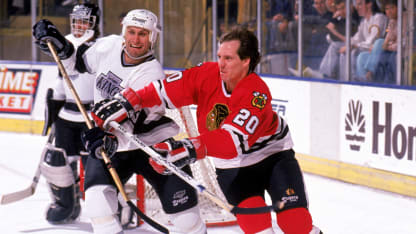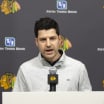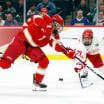This article was originally posted on April 7, 2010. Secord will take the ice for One More Shift on Nov. 12 before the Blackhawks host the New Jersey Devils.
Al Secord rarely went looking for trouble, but when trouble beckoned, he was ready and able to oblige. He was tougher than a $2 steak, and more often than not, Secord's mood had nothing whatsoever to do with self-preservation.
"With Al around, I always had peace of mind when I stepped on the ice," recalls Secord's erstwhile center man, Hall of Famer Denis Savard. "He was always there to protect me, to protect any of us. I had to tone him down every once in a while. Somebody might get rough with me, and he said, 'Well, Savy, I'll see you in five minutes.' He was gonna go fight the guy."
The Verdict: Secord Provided Scoring, Peace of Mind

By
Bob Verdi
Blackhawks.com
Secord will have his gloves off again for the Blackhawks' game April 11 against the Detroit Red Wings, but only to provide peaceful autographs at the Alumni signing booth before and during the regular season finale. If tradition holds, the waiting line will be considerable because, on merit, Secord is one of the most popular hockey players in Chicago history festooned with stars.
In a city that reveres athletes possessing an earnest work ethic, regardless of sport, Secord was a perfect fit-a no-collar, no-nonsense competitor who spoke softly but commanded space by his mere presence and never took a shift off unless, as Savard noted, duty required that a penalty be served. When Chicago acquired Secord from Boston for defenseman Mike O'Connell in mid-season of 1980, the Bruins no more imagined that they were trading for a future general manager than the Blackhawks foresaw that they were about to obtain someone who would blossom into a prolific scorer.
"I was a late bloomer," says Secord, who as Boston's No. 1 draft choice in 1978, joined a team with an impressive roster-Rick Middleton, Peter McNab, Terry O'Reilly, Jean Ratelle, Wayne Cashman-and a coach, Don Cherry, who understandably leaned on veterans and eased rookies into the system. Cherry thoroughly enjoyed Secord's style, and the admiration remains mutual: "He's the best I ever played for," says Secord.
But in Chicago, Secord took to the raucous Stadium as fans gravitated toward him. Ice time increased, and Secord collected 44 goals in 80 games during his first full season of 1981-82, not counting the five games he spent doing penance (303 minutes). Savard was simultaneously establishing his brilliance, and Secord will tell you to this day that having that sprightly genius making plays in the middle made navigating the left wing infinitely more manageable.
Then, in the autumn of 1982, the Blackhawks' sixth round draft choice-and 120th overall, would you believe-showed up. Steve Larmer went to the right side, his off wing, and that line became the scourge of the NHL. Secord amassed 54 goals-only the second player in franchise annals to crack Bobby Hull territory-Savard contributed 35 with 86 assists, and Larmer clicked for 43 and 47 en route to Calder Trophy honors as Rookie of the Year. If you're scoring at home, that's 297 points for one unit.
"We all had our roles," says Savard. "Plus, we had Doug Wilson and Bob Murray on defense. Larms was great. He played hurt with all kinds of injuries he never talked about.
He was as good on the road as he was at the Stadium. If you ask the guys who were in the league at the time, they'll tell you he was the most underrated player they ever played against. And Al, he was smart, strong on his skates with a terrific shot. And was he a warrior. I remember one fight he had against Paul Holmgren of the Flyers. They just kept going after each other, back and forth. They were both bleeding, both took stitches. It was unreal. We had great chemistry, that line. And like I said, with Al, I knew he'd always be there for me."
Secord was ahead of the curve in physical conditioning and also pro-active about a career after hockey. While a Blackhawk, he developed an affinity for flying, and his hobby turned into a vocation. Based in Dallas, Secord has been a first officer with American Airlines for 12 years, logging 80-plus hours per month. Wife Tracy is also a pilot, and their schedule is such that one is always home with sons Alec, 8 and Luke, 7. When Al is on the ground, he's coaching the boys in hockey or still mixing it up himself in a senior league, although he has yet to match his Chicago franchise record for four fastest goals within 8:24 on Jan. 7, 1987.
"About three pounds heavier than my NHL weight," says Secord. "If you look at pilots when you're going through an airport, you'll notice they're in good shape. You have to be. You have a lot a responsibilities flying an airplane and I've met some amazingly impressive people in this job. I trained hard in hockey to get better and try to improve my skills, and it's no different now. You have to be aware of your sleep, your fitness and your diet. Once the cockpit door closes, it's a real rush. There's a freedom about flying, but also obviously a challenge.
"I don't even mind flying in bad weather. I kind of like it, in fact. I liked fighting, too. It was part of the game. I wasn't a bully or dirty. But it was my role. Savy was our bread and butter. I always kept an eye peeled. I didn't always win. I saw some guys I fought like Willi Plett in street clothes and thought to myself, 'wow, look at the size of him.' Dave Richter of the North Stars. He was another one."
Not unlike the rest of us, Secord's life changed on 9/11.
"We lost a couple planes, American did. A guy who played for the Bruins, Ace Bailey, was killed that day by terrorists. That really hit close to home for me. Earth shaking. Crazy. That's why security is what it is now. Zero tolerance. Has to be. No other way."


















